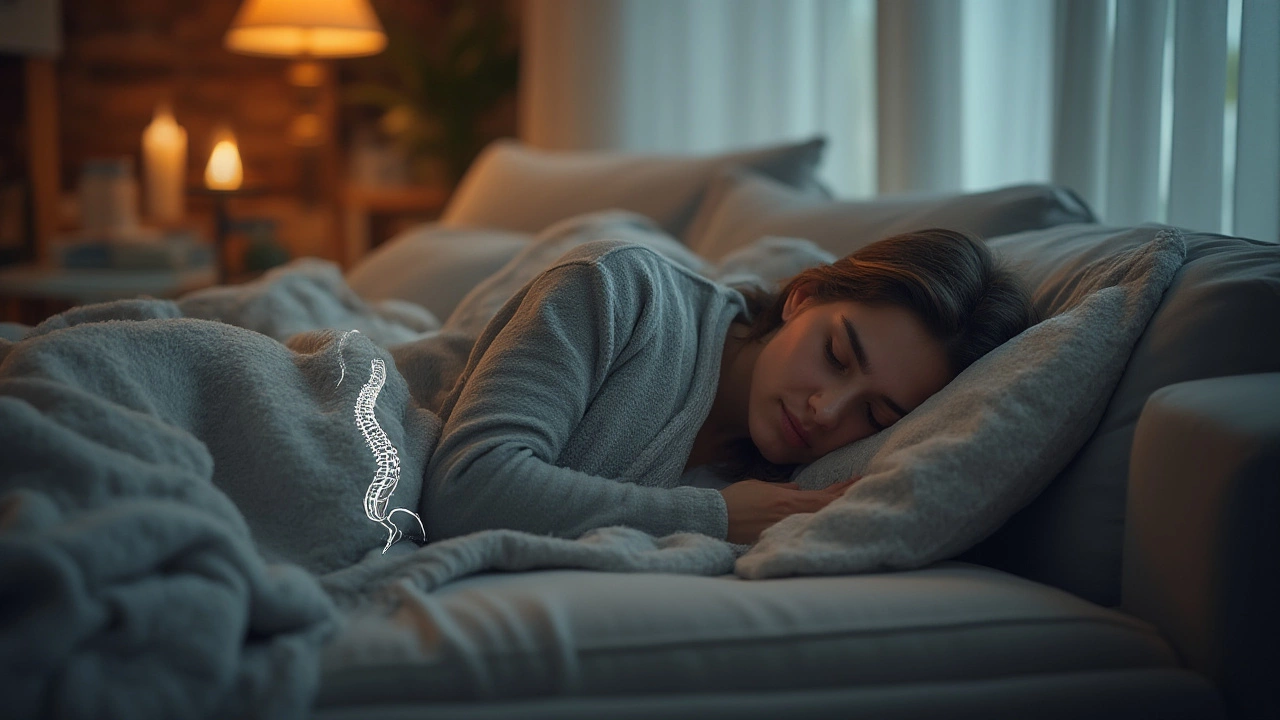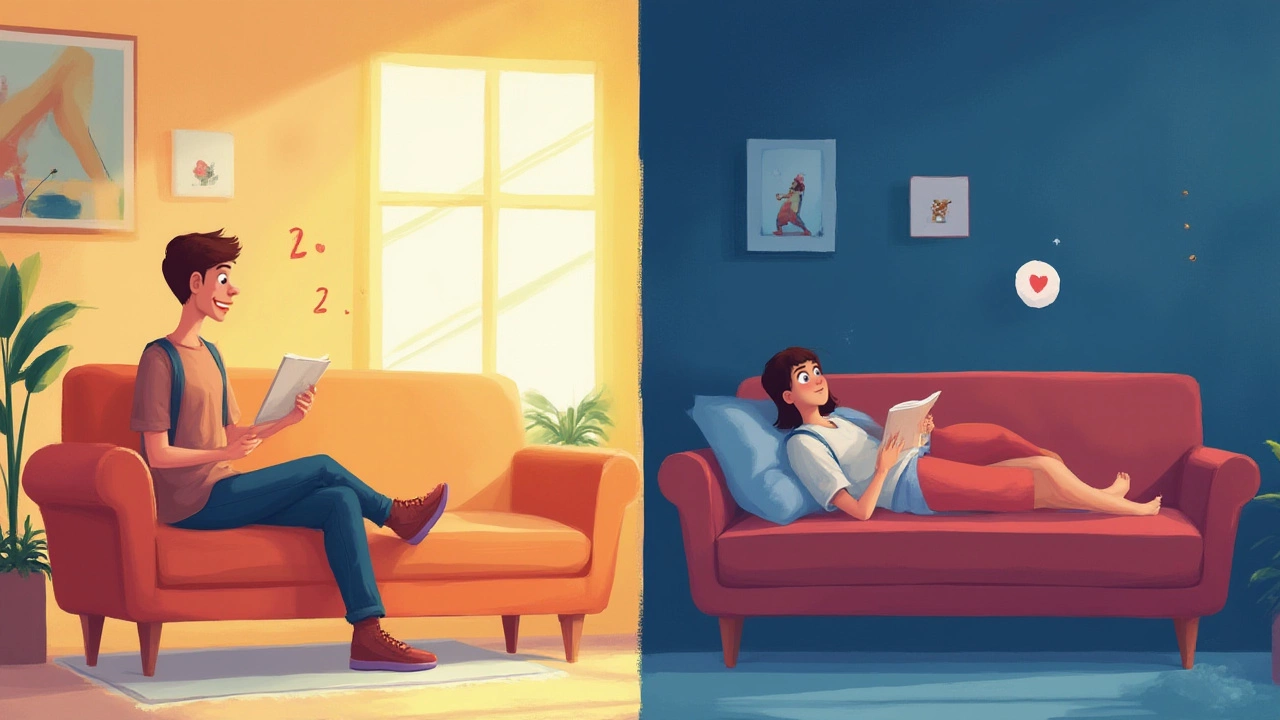
You might think crashing on the couch every night is a harmless habit, maybe even a sign of independence—or just a way to binge shows until you pass out. But here’s the wild part: the humble living room couch can be both a friend and a sneaky foe to your nightly rest. People around the world do it for all sorts of reasons, from tiny apartments to snoring partners or just loving that soft dip in the cushions. The question you should be asking is, what’s really happening to your body (and mind) when you make the sofa your nightly home? And is it really OK long-term?
Common Reasons People Sleep on the Couch
If you’ve ever stumbled onto the couch after a long night, you’re not alone. In fact, a 2023 survey by the National Sleep Foundation in the US found that about 20% of Americans admit to sleeping on their sofa regularly. The reasons? Some folks just need a change of scenery; others have partners who snore or kick. Parents escape to the lounge after restless kids take over the bed. Then you’ve got renters in tight flats—think about Wellington’s sky-high housing costs—who use couches as beds because they don’t have another choice. There are even some who say the motion of a TV in the background lulls them to sleep.
Another big factor is convenience. A lot of us plop down to watch a late movie or scroll on our phones and simply drift off. This is especially true in living rooms fitted with modern sectional sofas that rival some beds in plushness—who can blame you for drifting off? And yet, this habit can spiral into routine. Before you know it, the couch becomes Plan A instead of Plan B. There’s a psychological side, too: couches feel less formal, sometimes safer or cozier than the emptiness of a big bed, especially if you live alone. But, as plenty of sleep experts point out, what’s comfy for your mind isn’t always the best for your spine.
There’s also a cultural thing here. In countries where space is a premium, like in cities in Japan or big metros across Europe, “multifunctional furniture” is the norm. The couch isn’t just for guests; it’s where you eat, nap, and recharge. But the casual attitude can mask hidden problems that only show up over time. If you’re chronic couch-sleeper, you’ve probably heard more than a few jokes from friends or family. But it’s a more common habit than most people realize.
What Happens to Your Body When You Sleep on the Couch?
All right, here comes the science-y bit. Beds are engineered for sleep—mattresses distribute weight, keep the spine aligned, and make sure pressure points (like your hips and shoulders) don’t take all the strain. Sofas? Not so much. Most couches have a dip in the middle, cushions that squish down, and armrests that seem perfectly designed to jab you right in the ribs. Dr. Shelby Harris, a board-certified behavioral sleep medicine specialist, puts it simply:
“Regularly sleeping on the couch can lead to aches and pains, and, over time, may contribute to chronic musculoskeletal issues.”
A study from Johns Hopkins University highlights that consistent lack of spinal support during sleep can worsen back pain by up to 42%. Couches typically lack even support across your whole body. You end up sleeping at weird angles—curled up, knees tucked, neck twisted onto an armrest. This can actually compress nerves, leading to things like numb fingers or tingling in the arms by morning. Plus, softer sofas trap heat more than a standard mattress, so you’re likely to wake up sweaty and dehydrated.
Let’s throw in a little table for the nerds among us—the numbers say a lot:
| Sleep Factor | Bed | Couch |
|---|---|---|
| Spinal Support | Excellent (orthopedic design) | Poor (uneven, soft cushions) |
| Body Alignment | Neutral | Twisted/fixed positions |
| Heat Regulation | Good (breathable materials) | Poor (retains heat) |
| Disruption Rate | Low | High (noise, light, movement) |
| Allergy Risk | Low (with protection) | Higher (dust, pet hair) |
Long-term, sleeping on a couch can mess with your bones and joints. For people who already deal with back pain, arthritis, or sciatica, it’s like pouring vinegar in a paper cut. Even young, healthy people aren’t safe—if you wake up more tired or stiffer than when you went to bed, your couch may be telling you something.

How Couch Sleeping Affects Your Sleep Quality
Maybe you’re thinking, “Look, I fall asleep just fine—who cares where I do it?” But here’s where things get interesting: quality of sleep isn’t just about falling asleep, it’s about *staying* in the deeper stages that heal your mind and muscles. The National Sleep Foundation stresses that environmental factors matter more than you’d think. Sofas are usually smack dab in the center of household noise—TVs, fridges, flatmates nipping in for snacks at midnight. You’re exposed to more light, which kills melatonin production.
There’s a solid link between sleep location and how much REM sleep (that’s dream sleep) you get each night. One study in the journal “Sleep” found that people who switched from bed to couch for just a week lost about 11% of their deep sleep time—even though they were technically “asleep” the whole time. When you lose restful sleep, your memory, immune system, and even your mood all take a hit. This is why chronic couch sleepers often report grogginess, brain fog, and even more emotional ups and downs.
Another hidden culprit? Air quality. Sofas collect more dust, pet hair, and crumbs than you’d guess, leading to stuffy noses or allergies that kick up overnight. Plus, sleeping curled up in weird shapes can restrict your breathing, making issues like snoring or mild sleep apnea even worse. Light sleep means more tossing and turning—so you might wake up five, ten, even fifteen times a night without realizing it. Sound familiar?
Tips for Making Couch Sleeping Safer (If You Must)
OK, let’s be real: for some people, sleeping on the sofa isn’t a bad habit. It’s just reality. Maybe you’ve got a flatmate situation, your partner’s gotten ill, or your mattress is falling apart. To make it a little less punishing, try these practical steps:
- Pick the right couch: If you’re couch shopping with sleep in mind, firm cushions are key. Avoid deep “sink-in” sofas. Modular sectionals work best—they give you more room to stretch out fully.
- Add support: Grab a thick blanket, yoga mat, or even a folded duvet to create a flatter, firmer surface. It’s not a mattress, but it helps.
- Mind your neck: Ditch throw pillows and go for a proper pillow that fits the curve of your neck.
- Embrace the sleep routine: Even on a couch, stick to consistent sleep and wake times. Turn off the TV and dim the lights at least 30 minutes before sleep.
- Block out noise and light: Keep blackout curtains drawn and consider soft earplugs if your living room is close to street noise (pretty common in Wellington’s older apartments).
- Clean often: Beat and vacuum the cushions, and put on a clean sheet or cover. This helps cut down on allergens, especially if pets hog the sofa in the daytime.
- Watch your body: If you start waking up sore, consider stretching before and after you sleep—your lower back and hamstrings will thank you.

Is It OK to Sleep on a Couch Every Night: The Bottom Line
So, is sleeping on a couch every night going to ruin your life? Probably not right away. The human body is surprisingly adaptable, and there’s a good chance you’ll wake up feeling just fine for weeks or months—even years, if you’re lucky or young. But all those mornings when you roll out of bed (or off the couch) stiff, sore, or just less rested than you wish—it adds up. Your spine, neck, and shoulders want a break. Over time, things like chronic pain, worse allergies, and even depression can sneak up on you, hiding behind what seemed like a harmless snooze.
Sleep on a couch if you have to, but make it as safe and supportive as possible. If you’re just after a change of pace or peace and quiet, maybe try to solve the root problem, too—like investing in a better mattress, sorting out noise, or addressing sleep issues with your partner or family. At the end of the day, you want to wake up better than you went to sleep—and your couch, no matter how cozy, isn’t going to look after your health as well as a proper bed.



